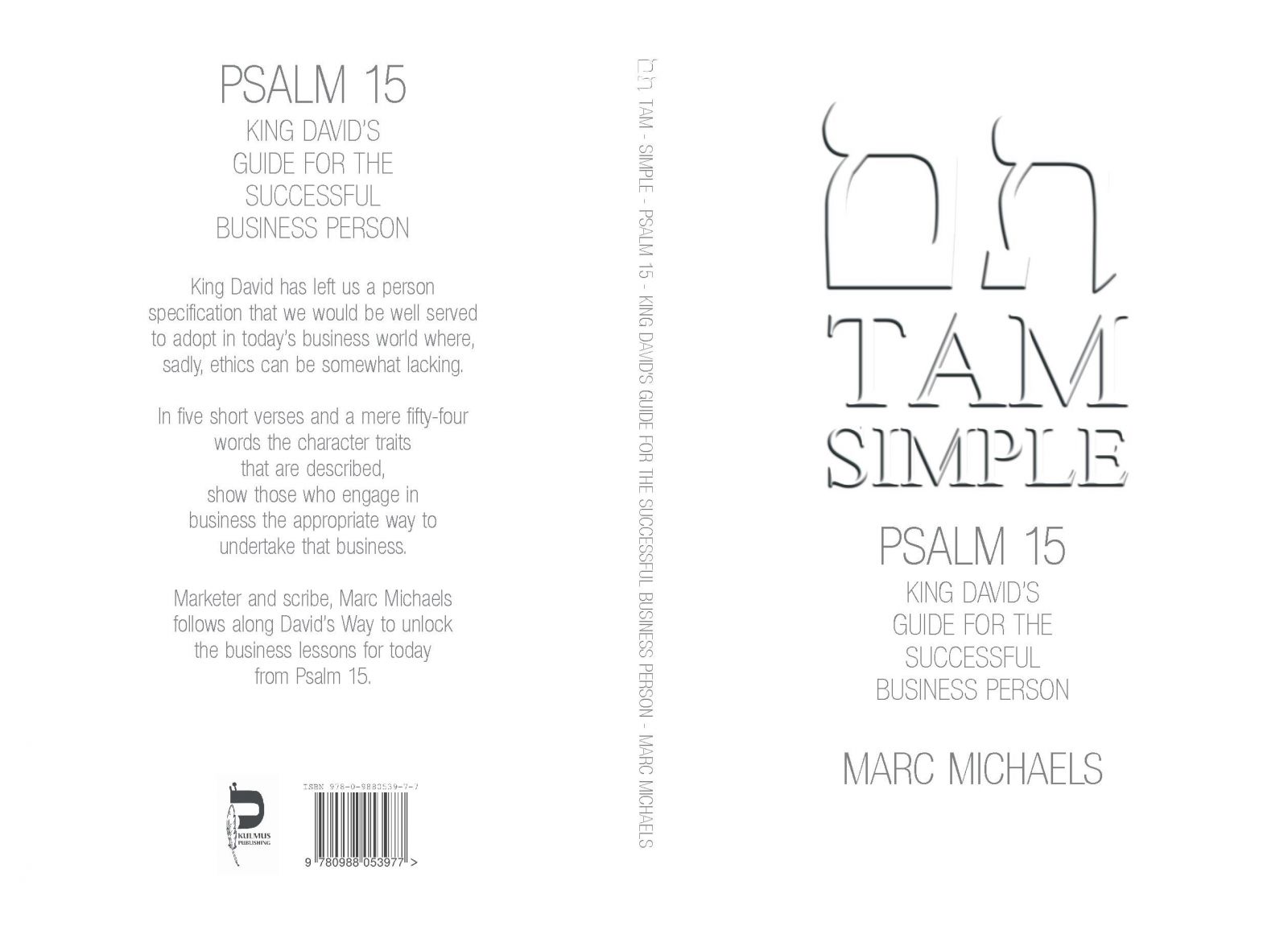 |
|
BLOG
King David Teaches Business Ethics
Surely God isn’t interested in business. Isn’t religion all about being spiritual and following lots of customs and rituals?
In fact, God does have a business mind and one of his top level executives, better known to us as King David, has left us a person specification - a competency framework if you will - that we would be well served to adopt in today’s business world where, sadly, ethics can be somewhat lacking. There are many fine character traits described in only five short verses of Psalm 15.
I’m a Sofer STa"M (scribe) and designer, but I’m also a Marketing Director and have worked in both the public (on social marketing) and private sector, as client, agency and intermediary for over 30 years. So I decided to blend all my worlds together in an accessible book Tam (Simple) for the lay-person looking at the ethical lessons we can derive from our heritage.
Let”s explore just one half of one of those verses.
... åÀãÉáÅø àÁîÆú בּÄìÀáÈáוֹ:
... v”dover emet bilvavo.
... and speaks the truth in/from his heart.
Different translations of this verse vary between speaking the truth from his heart and the truth in his heart. This is more than mere semantics. Speaking truth from one’s heart is about externalising what one holds to be true and communicating that to one’s fellows. This is a very interesting thought. How many times do people sit in a meeting wanting to contribute some piece of information that is the “truth” but because they are a “junior” member of staff they are scared of the repercussions. Or perhaps it is some very serious information that is being covered up by the organization and someone needs to become the “whistle-blower”. Either way, it requires the courage and strength of conviction to speak the truth as he or she sees it.
Or it could be as simple as being in a meeting where an unfamiliar term or piece of jargon is being used. You have a choice. You can sit there and pretend to understand and nod sagely while internally cursing your ignorance, and worse, curse yourself for not admitting that ignorance for fear of public shame. Or you can “fess-up and tell the truth. You could say that you wouldn’t mind a quick explanation that would help you grasp the entirety of the discussion.
Hands up. Who would have the guts to admit to a lack of knowledge in front of their peers? If you did then you would be “speaking the truth” as King David counsels.
Hands up. Who would have the guts to admit to a lack of knowledge in front of their peers? If you did then you would be “speaking the truth” as King David counsels.
Or, how many times does the agency account manager on learning a piece of information or of a mistake that may be of small import say, “Oh, we needn’t bother the client with that, they probably won’t find out and it’ll get sorted.” Have you heard this before? Worse still, have you said it? Don’t get me wrong, it’s an easy trap to fall into and I hate it every time I’m tempted.
It might get sorted. On the other hand it might be the start of some great unraveling of the project, a first indication of something going wrong. In which case, the client will want to know so they can take proactive and corrective action. A lack of honesty where the defensive shutters come down can lead to disaster.
A truthful approach where the issue is reported along with an understanding of the possible consequences and, more importantly, some suggestion of what might be done to address the issue, prevent it from getting worse is likely to yield better dividends than “radio silence”.
Even in a shop, a cashier might forget to charge you for something or give you too much change. If you notice it (and you might not) then at that point the “truth is in your heart” and when you go up to the cashier and tell them of the error and give them the extra money, then you have “spoken the truth”. This has happened to me a few times and most cashiers are amazed. My son also did this at a cinema, having discovered that they had not charged him for a fizzy drink. He had ordered a large drink and, after reporting the error, they decided to charge him for a regular. I was very proud of him.
How many people would just move on and pocket the excess? No-one would know but you. So what kind of person do you want to be, or have working with you?
Other translations of this phrase say that one should speak the truth in his heart. The opposite of this person who is found in Psalm 12:3 where people who “speak falsehood, each man with his neighbor” are described as speaking with “flattering lips and a double heart”.
A double heart doesn’t mean that one is a Time Lord (though I have learnt many lessons in ethics from Doctor Who too). Instead its modern counterpart would be that one is “two faced”. A good example here might be sucking up to the boss when you are with them, but doing down their abilities or character through gossip (another massive issue in the workplace) when you are with colleagues.
Similarly, we often see this phenomenon with hidden agendas that are guiding a business towards a particular path which might not be best for all those involved and only certain individuals are fully aware of the agenda. A different face is shown to staff who might be completely unaware of what is really going on.
And here we get to the nub of the matter. Truth, aside from its empirical value, leads to trust and trust leads to confidence that the person is a person of their word and will deliver the project on time, to budget, meeting the objectives set. Such people inspire confidence that they won’t let you down or try to cover issues up.
They will tell it as it is.
It seems so very obvious, but so many times people forget this and the trust is lost, possibly never to be regained.
Perhaps the most pointed lesson lies in a midrash about the Hebrew letters of the words for “truth” - àÁîÆú (emet) and “lie” - שׁÆ÷Æø (sheker). Truth rests on a strong foundation and you can build upon it. Lies and falsehoods are just so much puff and you can’t build a thing on that.

Interested in finding out more? Tam (Simple) by Marc Michaels is available in paperback and as an ebook.

Manuscript image (c) British Library Board (Harley MS 5771)
---
Have something to add? We'd love to hear from you. Please comment below to share.
 Why do we say Psalms when someone is ill? See answers from Orthodox, Conservative and Reform rabbis here.
Why do we say Psalms when someone is ill? See answers from Orthodox, Conservative and Reform rabbis here.If you have a question about Jewish values that you would like to ask rabbis from multiple denominations, click here to enter your question. We will ask rabbis on our panel for answers and post them. You can also search our repository of over 700 questions and answers about Jewish values.
For more great Jewish content, please subscribe in the right hand column. Once you confirm your subscription, you'll get an email whenever new content is published to the Jewish Values Online blog.
For more great Jewish content, please subscribe in the right hand column. Once you confirm your subscription, you'll get an email whenever new content is published to the Jewish Values Online blog.
|
|
|
Jewish Values Online
Home | Search For Answers | About | Origins | Blog Archive Copyright 2020 all rights reserved. Jewish Values Online N O T I C E
THE VIEWS EXPRESSED IN ANSWERS PROVIDED HEREIN ARE THOSE OF THE INDIVIDUAL JVO PANEL MEMBERS, AND DO NOT
NECESSARILY REFLECT OR REPRESENT THE VIEWS OF THE ORTHODOX, CONSERVATIVE OR REFORM MOVEMENTS, RESPECTIVELY. |